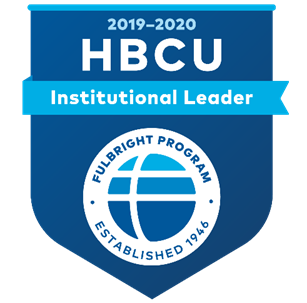AAMU Named HBCU Institutional Leader by Fulbright Program

AAMU Receives Distinction for Second Year
Alabama A&M University has been named a Fulbright Historically Black College and University Institutional Leader by the U.S. Department of State’s Bureau of Educational and Cultural Affairs (ECA). The Fulbright HBCU Institutional Leader designation recognizes AAMU’s noteworthy engagement with the Fulbright Program, which is currently celebrating its 75th anniversary.
ECA created the Fulbright HBCU Institutional Leaders initiative in recognition of the special role the nation’s 105 HBCUs play in making sure students, faculty, and administrators from all backgrounds are able to participate in and benefit from the Fulbright Program. The campuses being recognized today have taken part in a wide range of Fulbright Program activities that benefit their faculty, students, and administrators, including advising their U.S. students, welcoming foreign students, scholars, and Foreign Language Teaching Assistants, and building connections through International Education Administrators seminars.
The inaugural Fulbright HBCU Institutional Leaders were announced in 2019. This year marks the second time that AAMU achieved this recognition. The campuses highlighted this year demonstrated engagement with Fulbright exchange participants and promoted Fulbright Program opportunities on their campuses during the 2019-2020 academic year.
In December 2019, AAMU was part of the inaugural group of 19 institutions that received the designation for the 2018-19 academic year.
“We are proud to be a part of the distinguished list of leaders as determined by the Fulbright program,” commented AAMU President Andrew Hugine, Jr. “This distinction further serves to broaden our international profile and the global engagement of our entire University family.”
Fulbright-affiliated faculty members abound on the AAMU campus. Dr. Zachary N. Senwo, a professor of soil microbial biochemistry, environmental science and toxicology, wrote an interesting piece last year on microbes for the publication Scientia. AAMU chemist Adnan Elkhaldy has served on international boards and has conducted extensive synthetic chemistry research, while former business college dean and economist Amin U. Sarkar has presented at lectures throughout the world.
Acting Assistant Secretary of State for Educational and Cultural Affairs Matthew Lussenhop praised the institutions, stating, “Congratulations to this year’s 20 Fulbright Historically Black College and University Institutional Leaders. We salute you and your institutions for your engagement with the Fulbright Program, and for your commitment to providing life-changing opportunities to students, faculty, and administrators. HBCU participation is critical to fully representing the diversity of the United States through the Fulbright Program. This initiative is part of the U.S. Department of State’s long-standing commitment to build diversity and inclusion within the Fulbright Program and within the Bureau’s international exchange programs overall.”
The Fulbright Exchange Program is the U.S. Government’s premier international academic exchange program. A hallmark of the Fulbright Program has been its longstanding commitment to diversity, striving to ensure that its participants reflect U.S. society and societies abroad. The Program collaborates with a host of diversity-related organizations such as the White House Initiative on HBCUs, the Hispanic Association of Colleges and Universities, the National Clearinghouse on Disability and Exchange, the American Association of Community Colleges, Diversity Abroad, and many others.
On June 3, the Fulbright Program will host a Fulbright HBCU Symposium to discuss Fulbright opportunities and resources for HBCUs.
The Fulbright Program was created to increase mutual understanding between the people of the United States and the people of other countries. Fulbright is the world’s largest and most diverse international educational exchange program. The primary source of funding for the Fulbright Program is an annual appropriation made by the U.S. Congress to the U.S. Department of State’s Bureau of Educational and Cultural Affairs.
For further information about the Fulbright Program or the U.S. Department of State, please visit http://eca.state.gov/fulbright or contact the Bureau of Educational and Cultural Affairs Press Office by telephone 202-632-6452 or e-mail ECA-Press@state.gov
###